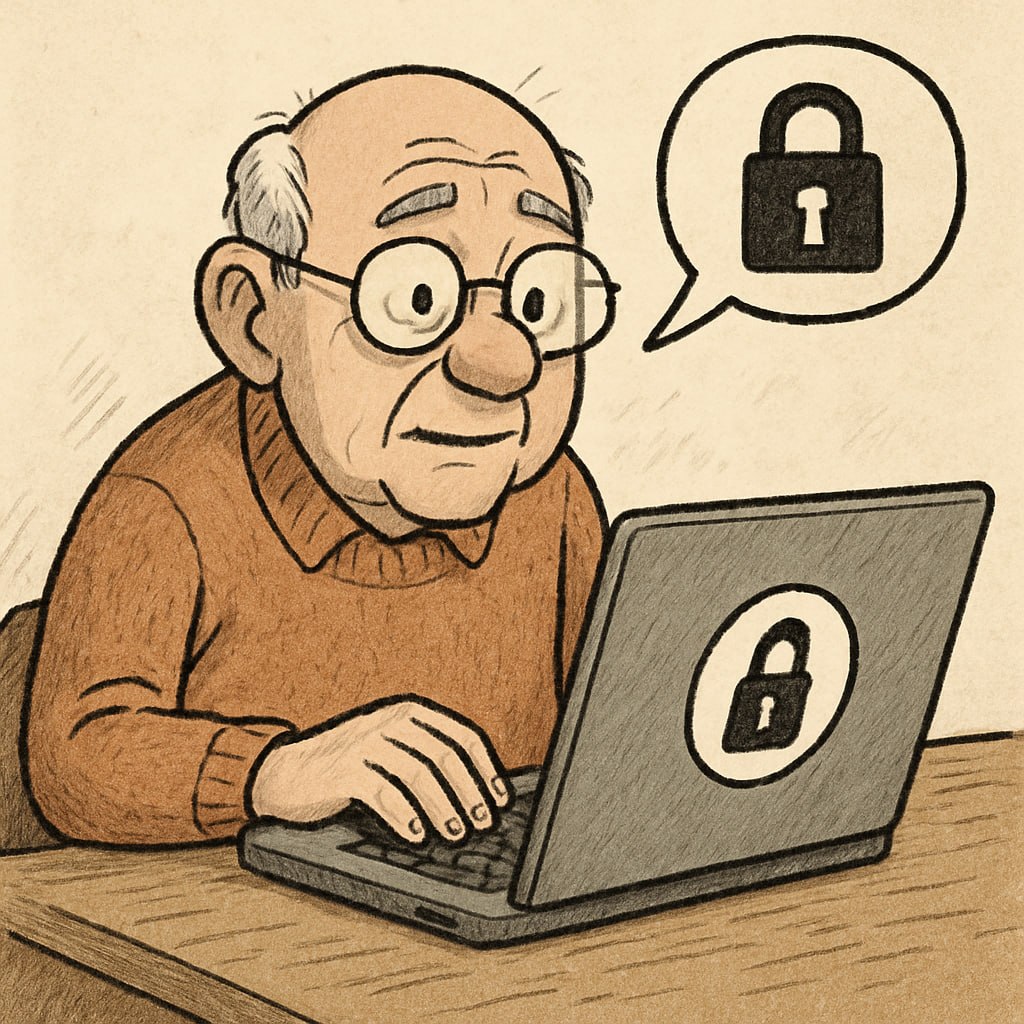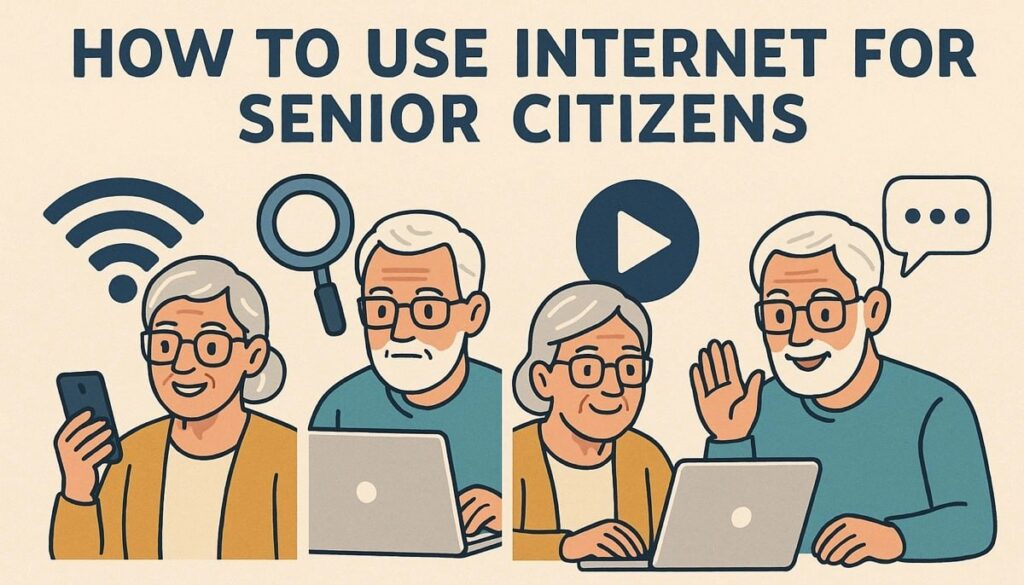How Internet for Seniors Can Enhance Daily Life

Broadband for pensioners isn’t just about entertainment. It can actually cut your dementia risk in half compared to those who don’t regularly use the internet. That’s a surprising benefit you probably didn’t expect from getting online.
But there are many more benefits. Research shows 76% of seniors feel more connected to family and friends when using technology.
This is important because up to 3.3 million older adults in the UK are lonely and have no friends or family around them.
The internet helps us keep in touch and make new friends, no matter how far apart we are.
Ready for more benefits?
Internet access helps 75% of seniors get involved with the community, and find better health services.
You can manage appointments, order prescriptions, and access important information without leaving your home. Online shopping and banking can save you valuable time and effort too.
Worried about costs? We’ll guide you through options for cheap broadband for pensioners and explore if free broadband for pensioners is available. We’ll also cover how to choose the right device, learn essential internet skills, and stay safe online.
You’ll get everything you need to confidently embrace the digital world on your terms.
How the Internet Improves Daily Life for Seniors
Digital connection offers more than basic entertainment. Let’s explore the real benefits that matter to your daily life.
Reducing loneliness through digital connection
Internet use helps seniors maintain social connections. 76% reporting feeling more connected to family and friends through technology.
The internet helps older adults stay in touch with family. It is an important way to get support and feel more connected to the community.
Video calls work particularly well. Using video calls on smartphones helps older adults feel less lonely. This improvement is seen at 1, 3, and 6 months after they start using it.
Research shows that people who use social media more often have bigger personal networks. They also make new friends and keep existing ones better than those who use social media less.
Talking online helps us keep our relationships strong if we can’t meet in person.
One study participant said about the Strava app: “It connects you with friends. If you can’t meet in person, you can still chat on the Strava app.”

Managing health appointments and prescriptions
For seniors with health issues, broadband for pensioners helps them use online services easily.
This proves especially valuable since elderly people typically need to visit doctors more frequently than younger adults.
Online consultations help you handle long-term health problems and get prescription refills more easily. 75% of seniors report having better access to health resources and services after adopting technology.
Many seniors now use equipment like fitness watches to support their health while living on their own. One participant shared: “I have a Fitbit, which I carry in a pocket all the time. I aim for 10,000 steps”.
Online appointments and chats may help solve transport challenges. This lowers costs and saves time for trips to appointments.
Enjoying hobbies and learning new skills online
The internet offers many chances for seniors to explore hobbies and learn new skills.
Online activities help older adults build skills while having fun:
- Virtual book clubs
- Digital art classes
- Memory games
Engaging in these activities contributes to cognitive health by keeping the mind active and agile. 88% of seniors navigate the internet more safely after learning technology skills.
Online hobbies are especially good for people with limited movement.
Doing things like solving digital puzzles or following online training, can help you get better at using the internet. These activities can also boost your confidence.
Get the Right Setup for Your Needs
Image Source: WP Fastest Cache Premium
Getting online starts with two key decisions: picking the right device and finding affordable internet service. We’ll help you choose what works best for your needs.
Pick your device: tablet, phone, or computer
Your device choice depends on what you want to do online.
Desktop computers have big screens and comfortable keyboards. They even offer large-print options for people with vision problems. They are great for making documents or looking at photos.
Laptops offer mobility while keeping all the functionality for multitasking.
Tablets are becoming the go-to choice for many seniors, with ownership rising from 18% to 32% between 2013 and 2016. These lightweight devices are easier to hold and need fewer steps to get tasks done. Got very dry fingertips that struggle with touchscreens? A stylus can help.
Some devices are made specifically for seniors. The GrandPad has a more sensitive touchscreen for dry skin. KOMP uses a single-button interface instead of a touchscreen.
Find broadband and phone deals for pensioners that fit your budget
Think about how you’ll use the internet first. Checking emails or browsing websites? A basic package will do the job. If you want video calls or streaming, you’ll need faster speeds.
BT and Sky options for pensioners
BT offers Home Essentials, broadband for pensioners on pension credit for those receiving certain benefits. This is the cheapest BT broadband for pensioners.
This 12-month contract offers cheap fibre internet. There will be no fees if you choose to leave early.
Free broadband for pensioners – what’s available?
True free broadband for pensioners doesn’t exist, but several providers offer social tariffs. They often provide the cheapest broadband for pensioners.
However, some companies have cheaper options.
Virgin Media provides social tariff broadband starting at £12.50 monthly for pensioners receiving Pension Credit.
Sky broadband for pensioners offers Sky Social Tariffs. These packages typically offer 30-day rolling contracts with no exit fees, giving you flexibility without long-term commitments.
Compare different providers before you commit. Find the best value for your specific needs and usage patterns.
Build Your Digital Confidence Step by Step
Don’t worry if technology feels overwhelming. 39% of over 65s report they don’t feel confident using a smartphone. You’re not alone in feeling apprehensive about getting started.
There is a lot of information to help you build digital skills at your own pace.

Get help from local classes
Local Age UKs offer computer training designed specifically for older people, explaining everything in plain English. Check your local library too – they often provide beginners’ internet classes.
The Online Centres Network has many Digital Inclusion Hubs all over the UK. These offer digital skills advice, support, and computer access.
Want professional help?
AbilityNet and BT Group have teamed up to offer over 1,000 training sessions. These sessions will be both in groups and individually, and they will take place all over the UK.
These free workshops cover essentials like:
- Email basics
- Video calling
- Online banking
- Healthcare management
Ask family or volunteers for one-on-one support
Nearly a fifth (19%) of seniors would be more inclined to build their digital confidence if someone showed them how to use technology. Don’t hesitate to ask tech-savvy family members – 52% of older adults already turn to their children for assistance.
Pat felt her lack of digital confidence was holding her back from fully enjoying her hobbies.
She went to a Digital Drop-in session and liked the one-on-one help she got.
Learn online at your own pace
AbilityNet offers “Bitesize Basics” videos under 10 minutes each, designed specifically for people over 65. These cover key topics from basic computer use to internet safety. You can learn at your own pace from home.
Age UK offers easy-to-follow guides. These guides help with tasks like sending emails, shopping online, and staying safe on the internet.
Start with simple apps and websites
Begin with simple applications like email or social media. Facebook remains the overwhelming social platform choice for 65% of older adults.
With practice, your confidence will grow. After learning technology skills, 88% of seniors navigate the internet more safely.
You can do this. Take it one step at a time.
Stay Safe Online – Protect Yourself with Confidence

To stay safe online, you need to be aware and careful, just like in real life.
After you set up your broadband for pensioners, it’s important to protect yourself.
Spot scams and phishing emails
Scammers frequently target older adults, with 90% of crimes committed against over-65s being fraud. These criminals create convincing fake emails that appear to be from trusted companies.
Watch for these warning signs:
- Urgent language pressuring immediate action
- Requests for personal information or passwords
- Messages asking you to click suspicious links
- Offers that seem too good to be true
Always pause before responding to unexpected messages. Research shows that taking time to think can help you avoid emotional responses that cause bad choices.
Delete suspicious emails immediately without clicking links or downloading attachments.
Create strong passwords and manage privacy
Set strong, unique passwords for each account as your first line of defence.
Good passwords use letters, numbers, and symbols. Don’t use personal details like birthdays.
Consider using three random words together (such as “YellowChairApple”) for a memorable yet secure option.
Never share passwords unless absolutely necessary. Enable two-factor authentication where available. This adds an extra verification step beyond your password.
Review privacy settings regularly on social media platforms to control who sees your information. These settings often change, requiring periodic updates.
Shop and bank online safely
Before entering payment information online, verify you’re on a secure website. Look for “https” (not just “http”) in the address bar and a padlock symbol. Legitimate shopping sites display full contact details.
Use credit cards rather than debit cards when possible—they offer better protection if disputes arise. Never save card details on shared computers and always keep an eye on your bank statements for unusual activity.
Remember that legitimate companies will never ask for your PIN online. If something feels suspicious, trust your instinct and seek advice from someone you trust.
We want you to feel confident and secure online. Take these steps at your own pace, and don’t hesitate to ask for help when you need it.
Ready to Get Online on Your Terms?
The internet puts you in control of your connections and independence. You can stay close to family, manage your health, and explore new interests – all from home.
Don’t let technology concerns hold you back. Help is available when you need it. Local classes, family support, and online tutorials make learning simple.
Your safety matters. Strong passwords and awareness of scams keep you protected while you enjoy everything the internet offers.
Whether you choose BT, Virgin Media, or another provider, affordable broadband options exist for pensioners. Pick the device that suits you best – tablet, phone, or computer.
You deserve to stay connected and independent. The internet helps you do both.



